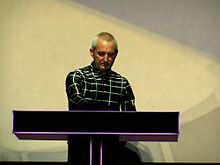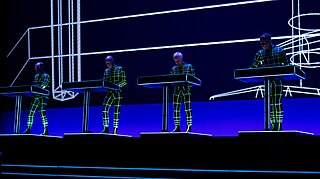
Kraftwerk are a German electronic band formed in Düsseldorf in 1970 by Ralf Hütter and Florian Schneider. Widely considered innovators and pioneers of electronic music, Kraftwerk were among the first successful acts to popularize the genre. The group began as part of West Germany's experimental krautrock scene in the early 1970s before fully embracing electronic instrumentation, including synthesizers, drum machines, and vocoders. Wolfgang Flür joined the band in 1973 and Karl Bartos in 1975, expanding the band to a quartet. Since the band's formation, it has seen numerous lineup changes, with Hütter as its only constant member.

Autobahn is the fourth studio album by German electronic music band Kraftwerk, released in November 1974 by Philips Records. The album marked several personnel changes in the band, which was initially a duo consisting of Florian Schneider and Ralf Hütter; later, the group added Klaus Röder on guitar and flute, and Wolfgang Flür on percussion. The album also completed the group's transition from the experimental krautrock style of their earlier work to an electronic pop sound consisting mostly of synthesizers and drum machines. Recording started at the group's own Kling Klang facility, but was predominantly made at Conny Plank's studio. Autobahn also includes lyrics and a new look for the group that was suggested by Emil Schult, an associate of Schneider and Hütter.

Tour de France Soundtracks is the eleventh and final studio album by German electronic music band Kraftwerk. It was first released on 4 August 2003, through Kling Klang and EMI in Europe and Astralwerks in North America. The album was recorded for the 100th anniversary of the first Tour de France bicycle race, although it missed its intended release date for the actual tour. It includes a new recording of their 1983 song of the same name, the cover artwork of both releases being nearly identical. The announcement of the release caused much anticipation, as it had been 17 years since the group had put out a full album of new studio material. It is also the last studio album to feature Florian Schneider before his departure from the band in 2008 and his death on 21 April 2020.
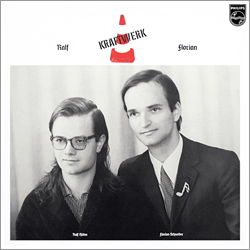
Ralf und Florian is the third studio album by the German electronic band Kraftwerk. It was released in October 1973 on Philips. It saw the group moving toward their signature electronic sound. It reached #160 on the US Top 200 Albums Chart in 1975.
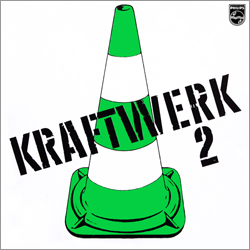
Kraftwerk 2 is the second studio album by German electronic band Kraftwerk, released in January 1972.

Kraftwerk is the debut studio album by German electronic band Kraftwerk. It was released in Germany in 1970, and produced by Konrad "Conny" Plank.

Radio-Activity is the fifth studio album by German electronic music band Kraftwerk, released in October 1975. The band's first entirely electronic album is also a concept album organized around the themes of radioactive decay and radio communication. All releases of the album were bilingual, with lyrics in both English and German. The album was accompanied by single release of the title track, which was successful in France and Belgium.

The Mix is the tenth studio album by the German electronic music band Kraftwerk. It was released on 11 June 1991 by Kling Klang and EMI in Europe and by Elektra Records in North America. It features entirely re-arranged and re-recorded versions of a selection of songs which had originally appeared on Kraftwerk's albums Autobahn (1974) through Electric Café (1986). Some of the songs, such as "The Robots" and "Radioactivity", feature new additional melodies and/or lyrics.

Florian Schneider-Esleben was a German musician. He is best known as one of the founding members and leaders of the electronic band Kraftwerk, performing his role with the band until his departure in 2008.

The Catalogue is a box set consisting of the eight albums by German electronic music band Kraftwerk that were released from 1974 to 2003. All albums are digitally remastered, with most of the cover art redesigned, including rare photographs in the liner notes that were not part of each album's original release.

Konrad "Conny" Plank was a German record producer and musician. He is known for his innovative work as a sound engineer and producer in Germany's krautrock and kosmische music scene in the 1970s. Plank was involved in releases by Neu!, Kraftwerk, Cluster, Harmonia, Ash Ra Tempel, Guru Guru, Kraan, and other German groups of the era. He later produced for new wave acts such as D.A.F., Eurythmics and Ultravox. As a billed performer, Plank also formed the group Moebius & Plank, releasing 5 albums between 1979 and 1986.

Neu! were a West German krautrock band formed in Düsseldorf in 1971 by Klaus Dinger and Michael Rother following their departure from Kraftwerk. The group's albums were produced by Conny Plank, who has been regarded as the group's "hidden member". They released three albums in their initial incarnation—Neu! (1972), Neu! 2 (1973), and Neu! 75 (1975)—before disbanding in 1975. They briefly reunited in the mid-1980s.
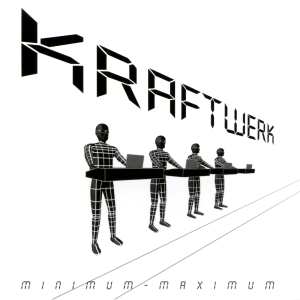
Minimum-Maximum is the first official live album release by Kraftwerk, released in June 2005, almost 35 years after the group gave its first live performance. The album features two CDs of tracks recorded on the group's world tour during 2004, including concerts in Warsaw, Ljubljana, Moscow, Berlin, London, Budapest, Tallinn, Riga, Tokyo, and San Francisco.
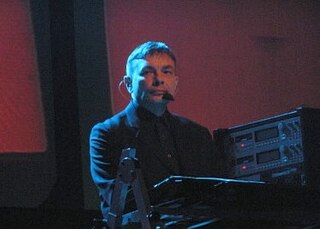
Karl Bartos is a German musician and composer known for his contributions to the electronic band Kraftwerk.

"11 O'Clock Tick Tock" is a song by Irish rock band U2. It was released as a single on 16 May 1980, and was produced by Martin Hannett. It followed their debut EP Three and the single "Another Day." It was the group's first release for Island Records. The song's lyrics were written by lead vocalist Bono based on his experience at a Cramps concert in London, where he watched a "lifeless, goth-style" crowd from the balcony.
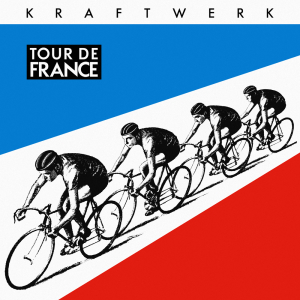
"Tour de France" is a song by German electronic band Kraftwerk. It was first issued in early August 1983, peaking at number 22 in the United Kingdom singles chart on 6 August.

Klaus Dinger was a German musician and songwriter most famous for his contributions to the seminal krautrock band Neu!. He was also the guitarist and chief songwriter of new wave group La Düsseldorf and briefly the percussionist of Kraftwerk.

Fernando Fromm-Abrantes is a German-Portuguese producer and musician.

"Musique Non Stop" is a 1986 single by German techno group Kraftwerk, which was featured on the album Electric Café. It was re-released as a remix on their 1991 album The Mix. The single was their first number one on Billboard Hot Dance Club Play and was one of two songs to make it to number one there.

Falk Grieffenhagen is a German musician who is a member of the electronic/experimental pop band Kraftwerk.
